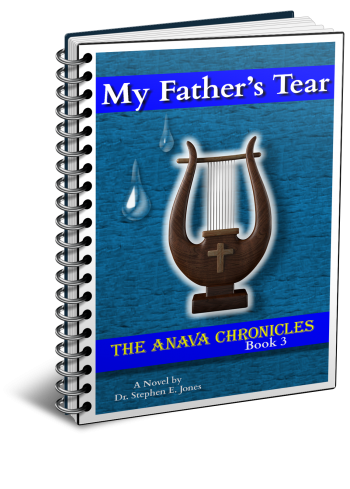Latest Posts
View the latest posts in an easy-to-read list format, with filtering options.

This is the third book in The Anava Chronicles, focusing on the main theme of Divine Provision. We go back in time to Israel during their Philistine captivity to interact with Samson and Samuel, first when the boys are five years old, and then again when they are twenty. We keep the feast of Tabernacles at Shiloh with Rephah's family and Samuel, showing the connection between the seven main speeches of Moses and the first seven miracle-signs in the book of John.
Category - Biblical Novels

It was late in the evening when we returned to Shiloh. We arrived at Nathan’s tent just as they were ready to go to bed. They would not wait until morning to hear our story, however, because we still had a residual glow upon our faces from the glory encounter. They were curious, but unafraid, so we told them the story from start to finish. It was near midnight when Samuel returned to his house and we finally went to bed.
In the morning, Samuel arrived early to walk with us to the tabernacle. It was the second day of Sukkoth, and I went up with him to the tabernacle for the morning prayer. After the sacrifice had been offered and the prayer of blessing given by Hophni, we turned and followed the dense crowd back to our tent.
But as we walked among the crowd toward the gate, we waved to Eli who was sitting on his raised throne, greeting and blessing the people as they passed. When Eli saw us, he pointed to us and said something to a man standing next to him. The man then waited anxiously for us to make our way slowly to the gate.
“Samuel!” he said at last. “I have been looking for you! You have a reputation for being a prophet. I hope that you can prove yourself now, for my son is very sick. Please come down to my tent and pray for him before he dies.” 117
I remained silent, but looked at Samuel, wondering what he would say. Samuel sighed. “Unless you people see signs and wonders, you simply will not believe,” he said. 118
“Please come!” the man said.
“What is your name?”
“Kish, son of Abiel, of the tribe of Benjamin,” he replied. “My son’s name is Saul, for we asked God for a son, and he was God’s answer. We could not bear it if God would now take him from us.”
“How old is the boy?” Samuel asked.
“He is just six years old. He is very sick, and when I left him to seek for you, he had become unconscious. He seems to be at the very door of death.”
“Go your way; your son lives,” Samuel said. “He has been called of God and must yet fulfill his destiny. But I would give you a word of caution to guide your steps and the steps of your son.”
Kish seemed anxious to leave, but he respectfully waited to hear Samuel’s words.
“Your son will prosper in his calling for as long as he remembers the laws, statutes, and judgments of God. But train your son diligently, lest he forgets the One from whom all blessings flow. When he has eaten and is satisfied, when he has built a large house and is settled in it, when his flocks and herds are multiplied, and when he has become wealthy with silver and gold—then he must beware, lest his heart becomes proud, and he says in his heart, ‘My power and the strength of my hand made me this wealth.’ If he forgets the God of Israel, he will surely perish and will not live out his days in peace.” 119
“I will teach him the virtue of humility, as you have instructed,” Kish said earnestly.
“See that you do,” Samuel said, satisfied that the man took heed to his instructions. “Your son is not a prophet, yet he will prophesy. Your son is not a priest, yet he will offer sacrifice. Your son is not of Judah, yet he will rule. He will be given a great privilege and opportunity in the Kingdom of Heaven, but this will test his heart. Power and wealth give men greater opportunity to do good—and also to become great sinners. Wealth allows men to fulfill the desires of their heart, whether for good or for evil. Ingrain in his heart that he is but a steward of God’s wealth and that he owns nothing that he did not create.”
“You speak in riddles,” Kish replied thoughtfully, “but I will teach him the laws of God, that he may love his neighbor as himself.” Looking past Samuel, he saw two young boys running toward them. “My servants are coming with news,” he said. “I pray it is good news.”
The boys were breathless when they stopped before us. “Your—your—son lives,” one of them said.
“He suddenly gained strength,” the other said.
“The fever left him, and he was suddenly hungry,” the first said again. “You need not trouble Samuel. He does not need to come.”
“Thank-you, boys,” Samuel said to them. “If we are no longer needed, we will be on our way. We have much meditation to do this afternoon. Meanwhile,” he said, turning to Kish, “meditate today on the second speech of Moses.”
We turned and walked back to Nathan’s tent.
“I will be getting married soon,” Samuel confided as we walked.
“Congratulations!” I said. “Who is the fortunate young woman?”
“My father, Eli, has arranged for me to marry a daughter of one of the priests in Bethel,” Samuel said. “She is a pretty girl, but I do not really know her. She comes from a good priestly family. Her name is Leah.”
“I wish you all the best,” I replied. “May you have many sons who follow in your footsteps.”
“Thank-you,” Samuel said.
We arrived at the tent and soon were eating a simple meal that had been prepared by Rebekah and Sipporah. Then we moved into the sukkah to hear the law and to meditate upon it. The Commandments were read, and we heard Moses’ account of the fire coming down upon Mount Horeb, the smoke covering the top of the mountain, and the voice that shook the earth when speaking to the people.
We discussed the people’s fear of hearing God’s voice and their desire for a man to hear God on their behalf. We discussed how the law was to be written on the hearts of men by hearing His voice.
“The advice that you gave Kish,” I said to Samuel, “came from the second speech of Moses.”
“Yes, I know,” he responded. “It was the word for today, and I knew that it applied to him and even more to his son. If Israel had been able to hear the voice of God at Mount Horeb, they would have had the faith to enter the land at the feast of Sukkoth a year later. They also would have obeyed His command not to bring the idols of the other nations into their houses.”
“Or into their hearts,” I added.
“Yes,” Samuel mused. “There are so many ifs, so many failures, so many regrets. Israel remains deeply flawed to this day, and I fear what will happen unless God moves to change their hearts.”
“Our decisions affect many generations,” I said, “but God’s decisions are greater. We are ruled and oppressed by our flawed decisions for only a season to humble us and teach us the seriousness of disobeying His commands. Yet none of these things can set aside His promise, nor can they prevent Him from showing mercy in the end. This is the law of Jubilee.”
“Israel became proud,” Nathan added. “God gave Israel a good land full of brooks and springs, fruit and grain. But they became proud of themselves, as if this wealth had come to them as the result of their own strength and effort.”
“You perceived correctly,” Pegasus interjected, looking at Samuel, “that the son of Kish would rule Israel even though he is not of Judah. You will anoint him some day as the King of Israel. But his heart will soon be lifted up in pride and disobedience. As a young man, he will be humble, for his father will teach him well. However, when he is anointed to rule as Israel’s king, he will reflect the heart of the nation, and therein lies the problem.”
“The same can be said of Eli himself,” I observed. “That is why Eli is so conflicted. As a man, he is himself, but as the High Priest, he must represent the heart of Israel as a whole. This is part of the principle of unity, where we are all members of a single body. The good are affected by the heart of idolaters. Yet in the end, this will be reversed, and the idolaters will be affected by the faith of the righteous.”
“We need such good news in times like these,” Eleazar said. “To be without hope wears out the soul and the body with it.
“Then let us determine to maintain righteousness and faith during this time of adversity,” Samuel said. “Let this be our encouragement, that our suffering is not in vain, but that it will work out for the good of all, both now and in our time of redemption.”